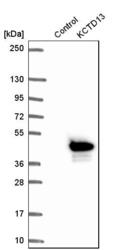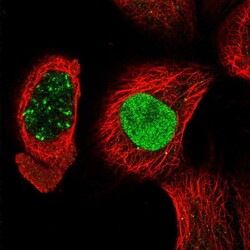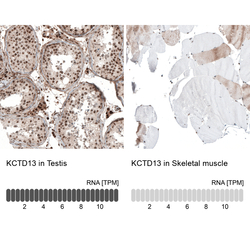Antibody data
- Antibody Data
- Antigen structure
- References [5]
- Comments [0]
- Validations
- Western blot [1]
- Immunocytochemistry [1]
- Immunohistochemistry [1]
Submit
Validation data
Reference
Comment
Report error
- Product number
- HPA043524 - Provider product page

- Provider
- Atlas Antibodies
- Proper citation
- Atlas Antibodies Cat#HPA043524, RRID:AB_2678528
- Product name
- Anti-KCTD13
- Antibody type
- Polyclonal
- Description
- Polyclonal Antibody against Human KCTD13, Gene description: potassium channel tetramerization domain containing 13, Alternative Gene Names: FKSG86, PDIP1, POLDIP1, Validated applications: WB, IHC, ICC, Uniprot ID: Q8WZ19, Storage: Store at +4°C for short term storage. Long time storage is recommended at -20°C.
- Reactivity
- Human
- Host
- Rabbit
- Conjugate
- Unconjugated
- Isotype
- IgG
- Vial size
- 100 µl
- Concentration
- 0.1 mg/ml
- Storage
- Store at +4°C for short term storage. Long time storage is recommended at -20°C.
- Handling
- The antibody solution should be gently mixed before use.
Submitted references Effects of heterozygous deletion of autism-related gene Cullin-3 in mice.
Gene dosage changes in KCTD13 result in penile and testicular anomalies via diminished androgen receptor function.
Targeting the RHOA pathway improves learning and memory in adult Kctd13 and 16p11.2 deletion mouse models.
Kctd13-deficient mice display short-term memory impairment and sex-dependent genetic interactions.
Kctd13 deletion reduces synaptic transmission via increased RhoA.
Xia QQ, Walker AK, Song C, Wang J, Singh A, Mobley JA, Xuan ZX, Singer JD, Powell CM
PloS one 2023;18(7):e0283299
PloS one 2023;18(7):e0283299
Gene dosage changes in KCTD13 result in penile and testicular anomalies via diminished androgen receptor function.
Seth A, Rivera A, Chahdi A, Choi IS, Medina-Martinez O, Lewis S, O'Neill M, Ridgeway A, Moore J, Jorgez C, Lamb DJ
FASEB journal : official publication of the Federation of American Societies for Experimental Biology 2022 Nov;36(11):e22567
FASEB journal : official publication of the Federation of American Societies for Experimental Biology 2022 Nov;36(11):e22567
Targeting the RHOA pathway improves learning and memory in adult Kctd13 and 16p11.2 deletion mouse models.
Martin Lorenzo S, Nalesso V, Chevalier C, Birling MC, Herault Y
Molecular autism 2021 Jan 13;12(1):1
Molecular autism 2021 Jan 13;12(1):1
Kctd13-deficient mice display short-term memory impairment and sex-dependent genetic interactions.
Arbogast T, Razaz P, Ellegood J, McKinstry SU, Erdin S, Currall B, Aneichyk T, Lerch JP, Qiu LR, Rodriguiz RM, Henkelman RM, Talkowski ME, Wetsel WC, Golzio C, Katsanis N
Human molecular genetics 2019 May 1;28(9):1474-1486
Human molecular genetics 2019 May 1;28(9):1474-1486
Kctd13 deletion reduces synaptic transmission via increased RhoA.
Escamilla CO, Filonova I, Walker AK, Xuan ZX, Holehonnur R, Espinosa F, Liu S, Thyme SB, López-García IA, Mendoza DB, Usui N, Ellegood J, Eisch AJ, Konopka G, Lerch JP, Schier AF, Speed HE, Powell CM
Nature 2017 Nov 9;551(7679):227-231
Nature 2017 Nov 9;551(7679):227-231
No comments: Submit comment
Enhanced validation
- Submitted by
- Atlas Antibodies (provider)
- Enhanced method
- Recombinant expression validation
- Main image

- Experimental details
- Western blot analysis in control (vector only transfected HEK293T lysate) and KCTD13 over-expression lysate (Co-expressed with a C-terminal myc-DDK tag (~3.1 kDa) in mammalian HEK293T cells, LY405827).
- Sample type
- Human
- Protocol
- Protocol
Supportive validation
- Submitted by
- Atlas Antibodies (provider)
- Main image

- Experimental details
- Immunofluorescent staining of human cell line A-431 shows localization to nucleus & nuclear bodies.
- Sample type
- Human
Supportive validation
- Submitted by
- Atlas Antibodies (provider)
- Enhanced method
- Orthogonal validation
- Main image

- Experimental details
- Immunohistochemistry analysis in human testis and skeletal muscle tissues using HPA043524 antibody. Corresponding KCTD13 RNA-seq data are presented for the same tissues.
- Sample type
- Human
- Protocol
- Protocol
 Explore
Explore Validate
Validate Learn
Learn Western blot
Western blot Immunocytochemistry
Immunocytochemistry